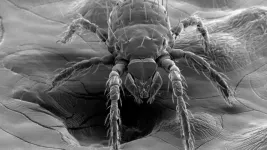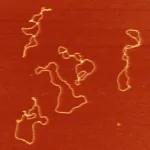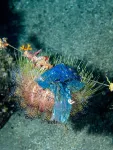(Press-News.org) New Haven, Conn. — Simply the smell of seafood can make those with an allergy to it violently ill — and therefore more likely to avoid it. The same avoidance behavior is exhibited by people who develop food poisoning after eating a certain meal.
Scientists have long known that the immune system played a key role in our reactions to allergens and pathogens in the environment, but it was unclear whether it played any role in prompting these types of behaviors towards allergic triggers.
According to Yale-led research published July 12 in the journal Nature, it turns out that the immune system plays a crucial role in changing our behaviors.
“We find immune recognition controls behavior, specifically defensive behaviors against toxins that are communicated first through antibodies and then to our brains,” said Ruslan Medzhitov, Sterling Professor of Immunobiology at Yale School of Medicine, investigator for the Howard Hughes Medical Institute, and senior author of the study.
Without immune system communication, the brain does not warn the body about potential dangers in the environment and does not try to avoid those threats, the study shows.
A team in the Medzhitov lab, led by Esther Florsheim, at the time a postdoctoral researcher at Yale and now an assistant professor at Arizona State University, and Nathaniel Bachtel, a graduate student at the School of Medicine, studied mice that had been sensitized to have allergic reactions to ova, a protein found in chicken eggs. As expected, these mice tended to avoid water laced with ova, while control mice tended to prefer ova-laced water sources. The aversion to ova-laced water sources in sensitized mice lasted for months, they found.
The team then examined whether they could alter the behavior of sensitized mice by manipulating immune system variables. They found, for instance, that mice allergic to ova lost their aversion to the protein in their water if Immunoglobulin E (IgE) antibodies, produced by the immune system, were blocked. IgE antibodies trigger the release of mast cells, a type of white blood cell that, along with other immune system proteins, plays a crucial role in communicating to areas of the brain that control aversion behavior. Without IgE as an initiator, the transmission of information was interrupted, so that mice no longer avoided the allergen.
Medzhitov said that the findings illustrate how the immune system evolved to help animals avoid dangerous ecological niches. Understanding how the immune system memorizes potential dangers, he added, could one day help suppress excessive reactions to many allergens and other pathogens.
END
How the immune system can alter our behavior
2023-07-12
ELSE PRESS RELEASES FROM THIS DATE:
Warmer ocean temperatures increase risk of salmon bycatch in Pacific hake fishery
2023-07-12
NEWPORT, Ore. – Rates of Chinook salmon bycatch in the Pacific hake fishery rise during years when ocean temperatures are warmer, a signal that climate change and increased frequency of marine heatwaves could lead to higher bycatch rates, new research indicates.
During years when sea surface temperatures were higher, including during a marine heatwave, Chinook salmon were more likely to overlap with the Pacific hake and raise the risk of bycatch as they sought refuge from higher temperatures.
The findings, based on ...
Bacterium associated with disease found in NC chiggers
2023-07-12
July 12, 2023
Bacterium Associated With Disease Found in N.C. Chiggers
EMBARGOED FOR RELEASE UNTIL NOON EDT ON WEDNESDAY, JULY 12
A bacterium that causes a disease called scrub typhus – a disease not previously reported in the United States – has been detected in North Carolina, according to a new study by researchers at North Carolina State University and UNC-Greensboro.
The researchers stress that scrub typhus, which can cause fever, headache and body aches – and can be fatal if left untreated by antibiotics – has not yet been ...
Mass General Brigham researchers make key improvements to Parkinson’s disease cell therapies
2023-07-12
Researchers at McLean and Mass General Hospital demonstrated that a transplant surgical procedure (called “needle trauma”) triggers a profound immune response and causes the death of most grafted dopamine neurons
They also found that co-transplantation of neuronal cell therapy with host regulatory T cells resulted in effective suppression of needle trauma and significant improvement in the survival and recovery of grafts
Findings suggest a path for the ‘realistic’ use of cell therapy to treat neurodegenerative disorders
Cell therapy holds promise as a new treatment for Parkinson’s disease but, in many trials to date, most transplanted dopamine ...
County-level income inequality, social mobility, and deaths of despair in the US
2023-07-12
About The Study: This study found that the joint exposure of unequal income distribution and lack of social mobility was associated with additional risks for deaths of despair (deaths from suicide, drug overdose, and alcohol-related liver disease), suggesting that addressing the underlying social and economic conditions is crucial in responding to the epidemic of deaths of despair.
Authors: Chun-Tung Kuo, Ph.D., of National Taiwan University in Taipei, is the corresponding author.
To access the embargoed study: Visit our ...
Trends in acute care use for mental health conditions among youth during pandemic
2023-07-12
About The Study: Into the second year of the pandemic, mental health emergency department visits increased notably among adolescent females, and there was an increase in prolonged boarding (waiting in an emergency department or medical inpatient unit) of youth awaiting inpatient psychiatric care. Interventions are needed to increase inpatient child psychiatry capacity and reduce strain on the acute mental health care system.
Authors: Haiden A. Huskamp, Ph.D., of Harvard Medical School in Boston, is the corresponding author.
To access the embargoed study: Visit our For The Media website at this link https://media.jamanetwork.com/
(10.1001/jamapsychiatry.2023.2195)
Editor’s ...
Study: The ocean’s color is changing as a consequence of climate change
2023-07-12
CAMBRIDGE, MA -- The ocean’s color has changed significantly over the last 20 years, and the global trend is likely a consequence of human-induced climate change, report scientists at MIT, the National Oceanography Center in the U.K., and elsewhere.
In a study appearing today in Nature, the team writes that they have detected changes in ocean color over the past two decades that cannot be explained by natural, year-to-year variability alone. These color shifts, though subtle to the human eye, have occurred over 56 percent of the world’s oceans — an expanse that is larger than ...
DNA element with a murky past is borrowing cell’s repair machinery
2023-07-12
Like its viral cousins, a somewhat parasitic DNA sequence called a retrotransposon has been found borrowing the cell’s own machinery to achieve its goals.
In a new work appearing online Wednesday in the journal Nature, a Duke University team has determined that retrotransposons hijack a little-known piece of the cell’s DNA repair function to close themselves into a ring-like shape and then create a matching double strand.
The finding upends 40 years of conventional wisdom saying these rings were just a useless by-product of bad gene copying. It may also offer new insights into cancer, viral infections and immune responses.
Retrotransposons are segments ...
Plastic pollution on coral reefs increases with depth and mostly comes from fishing activities, Nature study finds
2023-07-12
SAN FRANCISCO, CA (July 12, 2023) — In a paper published today in Nature, researchers from the California Academy of Sciences, University of São Paulo, University of Oxford, University of Exeter, and other collaborators reveal the extent of plastic pollution on coral reefs, finding that debris increases with depth, largely stems from fishing activities, and is correlated with proximity to marine protected areas.
Through underwater visual surveys spanning more than two dozen locations across the Indian, Pacific, and Atlantic ...
Mast cells as a sensor: Enigmatic immune cells help to avoid harmful allergens
2023-07-12
The function of mast cells, which are part of the immune system, is still a mystery. Scientists at the German Cancer Research Center (DKFZ) have now shown in mice: mast cells function as a sensor that signals the animals to avoid antigens, including harmful allergens, and thereby protect themselves from health-threatening inflammatory reactions. The findings were published in the journal Nature.
Mast cells are found primarily in tissues that separate the outside and inside worlds of the body, such ...
Detailed map of the heart provides new insights into cardiac health and disease
2023-07-12
In a new study, published today (12 July) in Nature, researchers have produced the most detailed and comprehensive human Heart Cell Atlas to date, including the specialised tissue of the cardiac conduction system - where the heartbeat originates.
The multi-centre team is led by the Wellcome Sanger Institute and the National Heart and Lung Institute at Imperial College London, and has also presented a new drug-repurposing computational tool called Drug2cell, which can provide insights into the effects of drugs on heart rate.
This study is part of the international Human Cell Atlas* ...



